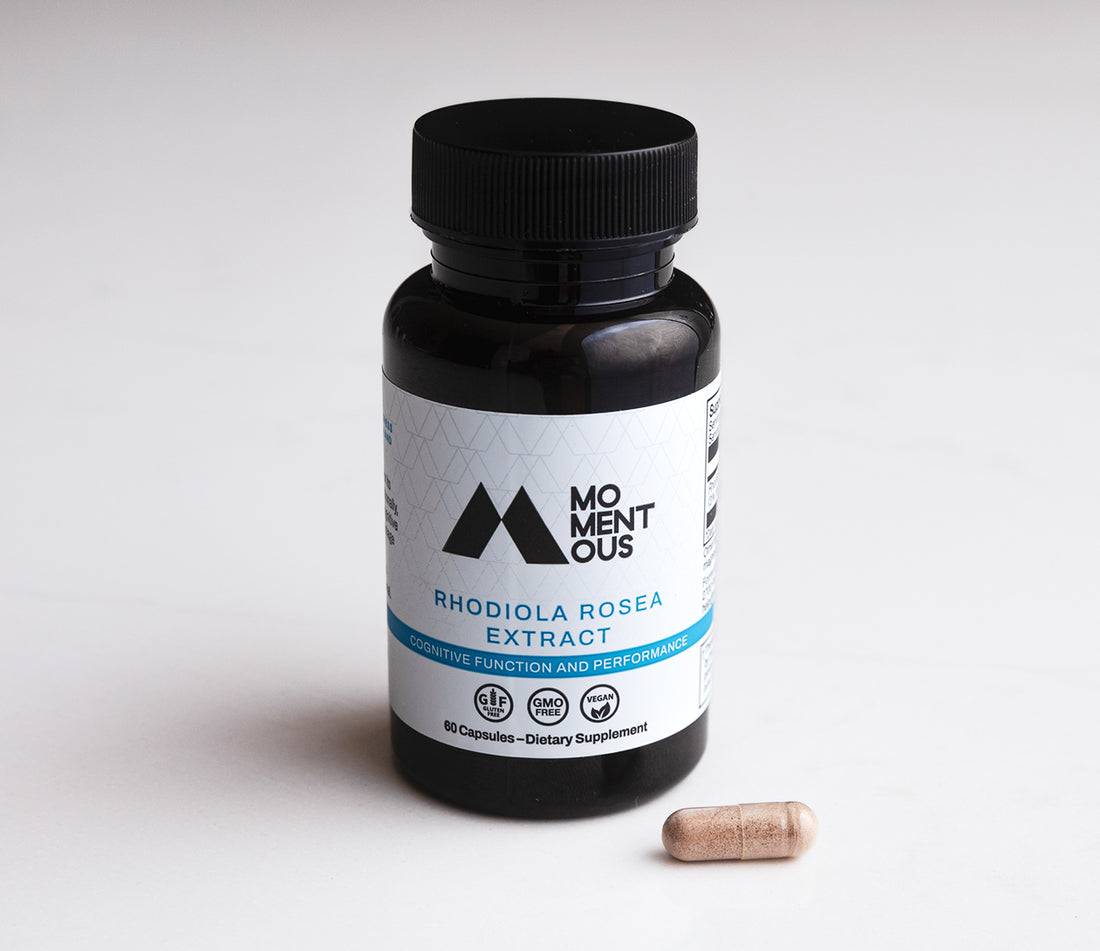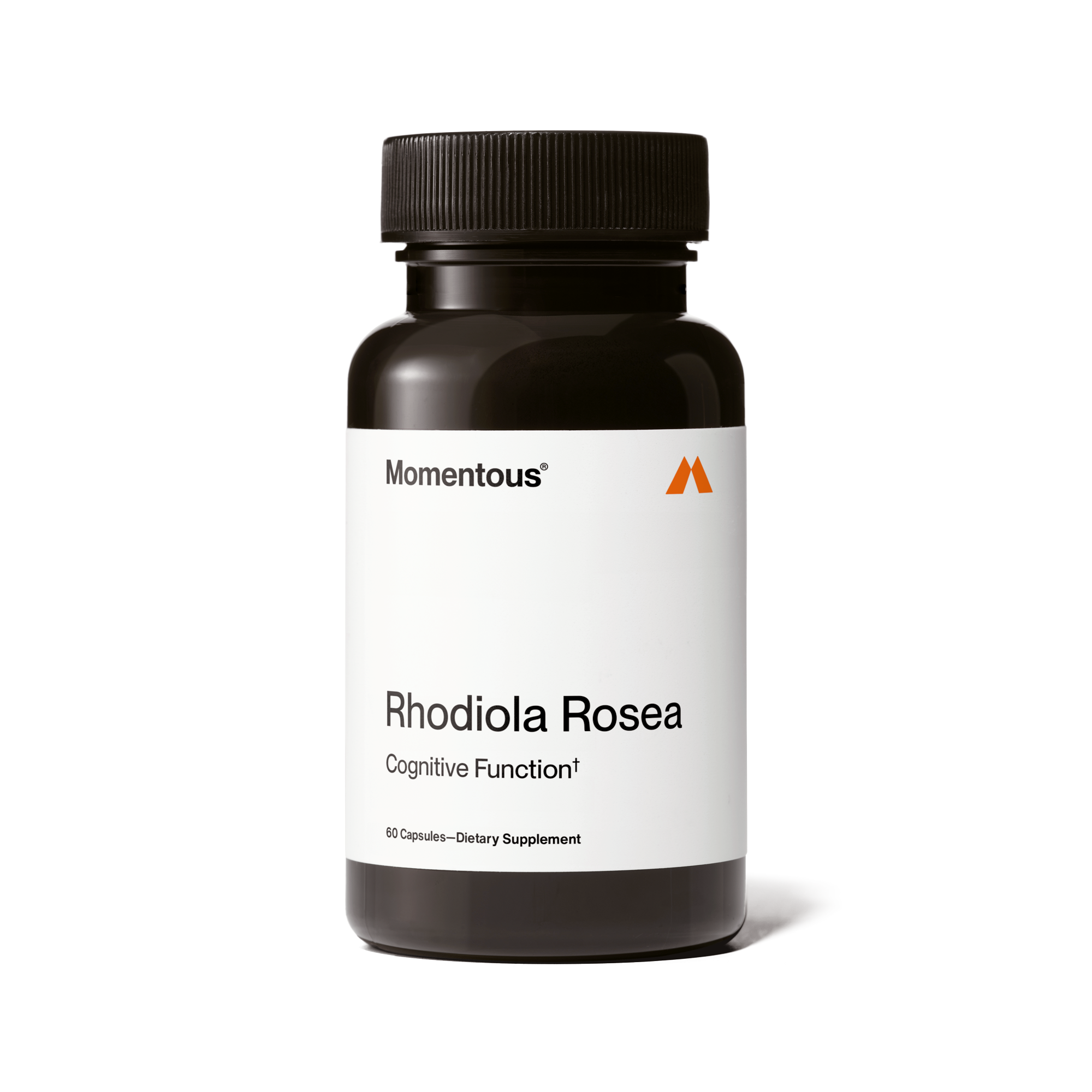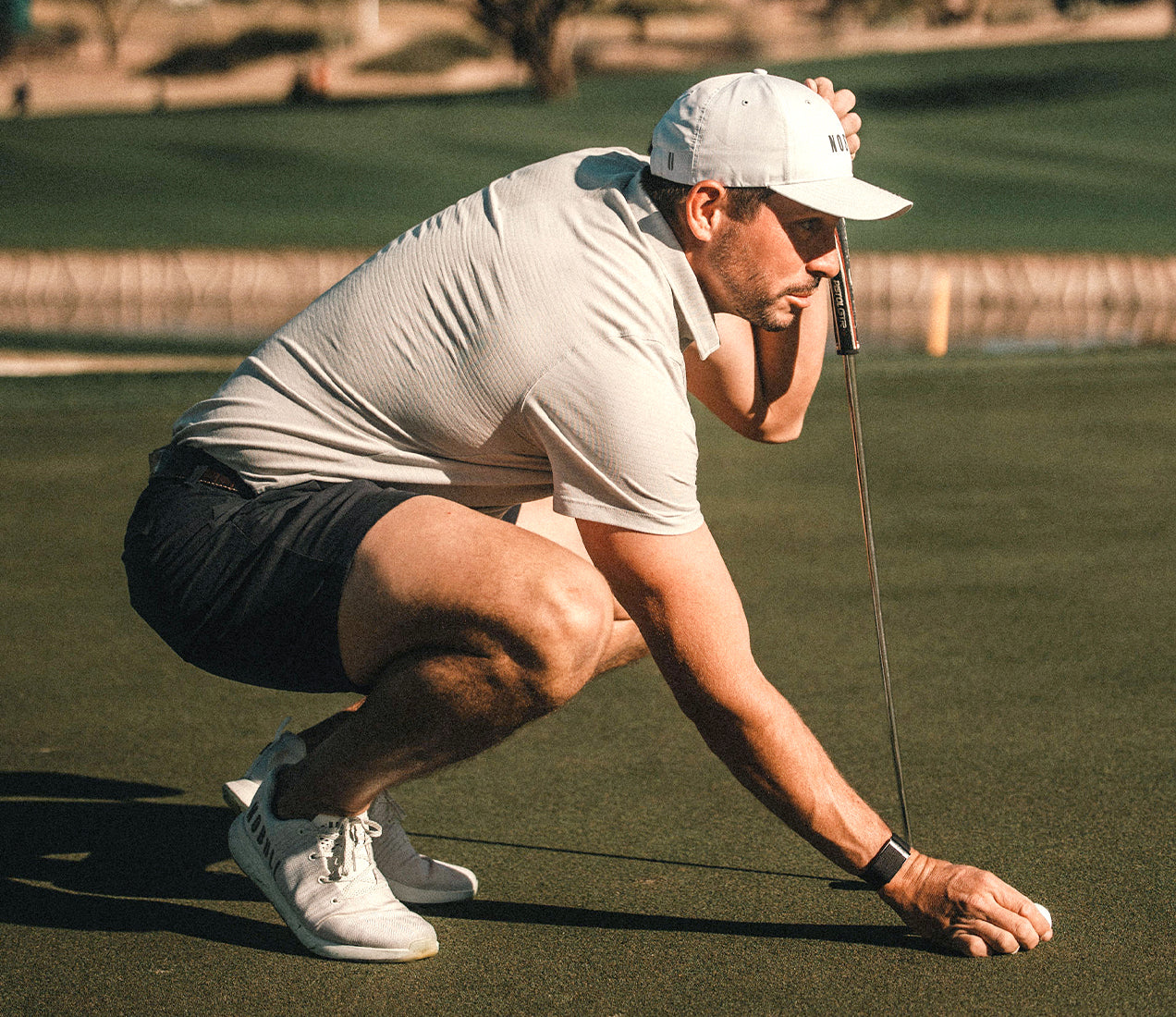Adaptogen that supports energy, mood, + stress resilience
This ancient adaptogen often referred to as the "golden root," has been used for centuries in traditional medicine for its numerous health benefits. Found in the frigid regions of Europe and Asia, Rhodiola Rosea is now making a big splash in the world of natural supplements and scientific research. Whether you're seeking a way to increase your physical performance or looking for a natural way to improve your mood, Rhodiola Rosea might be the solution you're searching for. So, what exactly is Rhodiola Rosea, and how does it work? Let's dive in and discover the science behind this powerful adaptogen.
What is Rhodiola Rosea?
Rhodiola Rosea is categorized as an adaptogen, which are plant-based substances known to enhance the body's ability to withstand physical and emotional stress. They work by affecting the area of the body responsible for regulating your stress response. In doing so, adaptogens help to regulate the production of cortisol. This hormone is often elevated in response to stress. As a result, using adaptogens can help the body better manage physical, environmental, and emotional stressors, leading to improved overall health and wellness.
How Does it Help?
As mentioned above, Rhodiola Rosea’s anti-stress effects seem to be linked to its ability to modulate cortisol release under stressful conditions. Although the exact mechanisms behind Rhodiola Rosea’s ability to mitigate stress are still unclear, multiple studies have demonstrated that it can have an effect on stress response signaling at the cellular and systemic level (1). Rhodiola Rosea’s role in regulating cortisol levels can have a cascading effect across many areas of your health including testosterone balance (2), reduced anxiety (3), and improved sleep (4).
Physical Benefits
The extract of Rhodiola Rosea has not only been shown to protect cells (5) from harm, but also to boost athletic performance (6). Specifically, acute Rhodiola Rosea intake has been shown to enhance endurance exercise capacity (7) as well as anaerobic exercise performance (8). Additionally, supplementing with Rhodiola Rosea has been found to reduce lactate levels and muscle damage after a strenuous exercise session (9). Finally, researchers have found that Rhodiola Rosea has protective effects against inflammatory injury for a range of diseases (10). All in all, it's a powerful adaptogen that helps keep you healthy and at your best.
Cognitive Benefits
The physical benefits of Rhodiola Rosea are vast. Still, this unique traditional medicine, with its combination of beneficial compounds, also makes it an effective tool for fighting stress and fatigue. Studies have shown it can act as an anti-depressive and improve emotional stability (11). It has also been shown to improve mental performance and ease certain mental health conditions (12). Finally, one study showed a significant reduction in self-reported anxiety, stress, anger, and a significant improvement in total mood (13). While more research is always welcome, we're excited by the findings thus far about how Rhodiola Rosea can improve cognitive performance.
Momentous Rhodiola Rosea
Although it is always wise to look at behavioral strategies first, Rhodiola Rosea is a versatile option when it comes to combating stress and boosting mental and physical performance. We are proud to offer a Rhodiola Rosea supplement backed by science and made with high-quality, natural ingredients. Our formula is designed to help you fight stress and anxiety while improving athletic performance so that you can live a healthier, happier life.
----- Panossian, A., Wikman, G., & Sarris, J. (2010). Rosenroot (Rhodiola rosea): traditional use, chemical composition, pharmacology and clinical efficacy. Phytomedicine: International Journal of Phytotherapy and Phytopharmacology, 17(7), 481–493.
- Brownlee, K.K., Moore, A.W., & Hackney, A.C. (2005). Relationship between circulating cortisol and testosterone: influence of physical exercise. Journal of sports science & medicine, 4 1, 76-83.
- Konstantinos, F., & Heun, R. (2020). The effects of Rhodiola Rosea supplementation on depression, anxiety and mood – A Systematic Review. Global Psychiatry, 3(1), 72–82.
- Hirotsu, C., Tufik, S., & Andersen, M. L. (2015). Interactions between sleep, stress, and metabolism: From physiological to pathological conditions. Sleep Science, 8(3), 143–152.
- Palumbo, D. R., Occhiuto, F., Spadaro, F., & Circosta, C. (2012). Rhodiola rosea extract protects human cortical neurons against glutamate and hydrogen peroxide-induced cell death through reduction in the accumulation of intracellular calcium: Neuroprotective effects of Rhodiola Rosea. Phytotherapy Research: PTR, 26(6), 878–883.
- Lu, Y., Deng, B., Xu, L., Liu, H., Song, Y., & Lin, F. (2022). Corrigendum: Effects of Rhodiola Rosea supplementation on exercise and sport: A systematic review. Frontiers in Nutrition, 9, 928909.
- Bystritsky, A., Kerwin, L., & Feusner, J. D. (2008). A pilot study of Rhodiola rosea (Rhodax) for generalized anxiety disorder (GAD). Journal of Alternative and Complementary Medicine (New York, N.Y.), 14(2), 175–180.
- Parisi, A., Tranchita, E., Duranti, G., Ciminelli, E., Quaranta, F., Ceci, R., Cerulli, C., Borrione, P., & Sabatini, S. (2010). Effects of chronic Rhodiola Rosea supplementation on sport performance and antioxidant capacity in trained male: preliminary results. The Journal of sports medicine and physical fitness, 50 1, 57-63.
- Ballmann, C.G., Maze, S.B., Wells, A.C., Marshall, M.M., & Rogers, R.R. (2018). Effects of short-term Rhodiola Rosea (Golden Root Extract) supplementation on anaerobic exercise performance. Journal of Sports Sciences, 37, 1003 - 998.
- Pu, W., Zhang, M., Bai, R., Sun, L., Li, W., Yu, Y., Zhang, Y., Song, L., Wang, Z., Peng, Y., Shi, H., Zhou, K., & Li, T. (2019). Anti-inflammatory effects of Rhodiola rosea L.: A review. Biomedicine & pharmacotherapy, 121, 109552.
- Darbinyan, V., Aslanyan, G., Amroyan, E., Gabrielyan, E., Malmström, C., & Panossian, A. (2007). Clinical trial of Rhodiola rosea L. extract SHR-5 in the treatment of mild to moderate depression. Nordic Journal of Psychiatry, 61(5), 343–348.
- Hung, S. K., Perry, R., & Ernst, E. (2011). The effectiveness and efficacy of Rhodiola rosea L.: a systematic review of randomized clinical trials. Phytomedicine: International Journal of Phytotherapy and Phytopharmacology, 18(4), 235–244.
- Cropley, M., Banks, A. P., & Boyle, J. (2015). The effects of Rhodiola rosea L. extract on anxiety, stress, cognition and other mood symptoms: Rhodiola rosea, mood and cognition. Phytotherapy Research: PTR, 29(12), 1934–1939.







